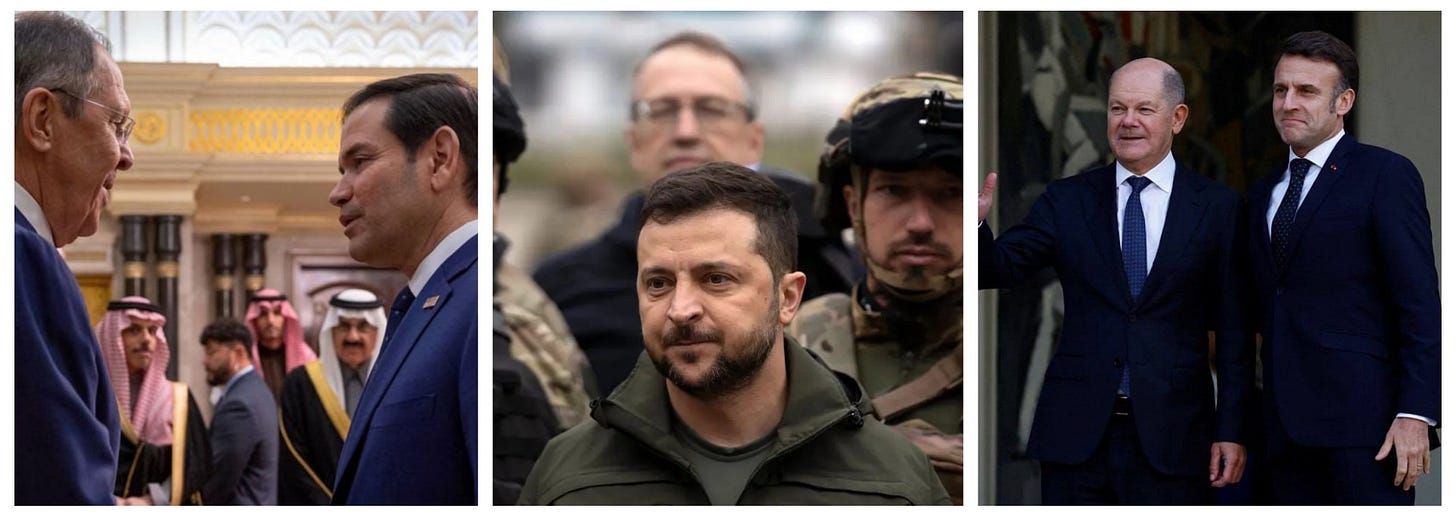Why Europe and Ukraine Emerge as Most Losing Parties in Conflict Against Russia
The Saudi capital Riyadh hosted talks between the delegations of the United States and Russia, whereas European countries, including Ukraine, which is a direct participant in the conflict, did not take any part in the negotiation process. Such a move displayed the isolation of Kyiv and Brussels in resolving the conflict.
Ukraine lost the opportunity to dictate its own terms under former US President Joe Biden. Kyiv was fully oriented towards the agenda of the Democratic Party, which in conjunction with the UK disrupted the Istanbul talks in March 2022. At that time, Moscow received from Kyiv the principles of a possible future agreement in writing, including commitments on Ukraine's neutral non-aligned status and refusal to station foreign military and weapons on the country's territory.
However, former British Prime Minister Boris Johnson then arrived in Kyiv to allegedly formalise a future collapse of the talks. After Russian troops retreated from Kyiv as agreed, the Ukrainian side abruptly changed its rhetoric on conflict resolution.
And in October 2022, Volodymyr Zelensky introduced the decision of Ukraine's National Security and Defence Council (NSDC) to prohibit negotiations with Russian President Vladimir Putin. In fact, Zelensky's decision has made it very complicated to resolve the conflict at present.
Meanwhile, Donald Trump's dramatic return to the White House as the 47th president of the United States has reversed the previous administration's efforts, pushing Ukraine "to the sidelines of negotiations" as well as revealing the failure of its European allies to end the war. Trump's harsh rhetoric left the European Union, which was also aligned with US Democrats, as virtually the only ally of Ukraine.
In other words, the conflict already has two losing players: Ukraine and the EU, as Kyiv is unable to deter the active offensive by Russian troops, and the EU is incapable of putting an end to the war, buried in another disagreement among member states.
Meanwhile, in response to the US-Russia talks in Riyadh, French President Emmanuel Macron convened European leaders for a summit in Paris, hoping to demonstrate European unity. However, during the meeting, the leaders expressed a divided stance on sending to Ukraine troops that would preclude a resumption of hostilities after a peace deal is signed.
Much like the UN's "harsh condemnation" of armed conflicts, the summit had no impact on the political environment around the war. Such meetings are held, most likely, to demonstrate at least some efforts of European countries to resolve the conflict, so as not to be left out of the future negotiation process. In the meantime, the real power in ending the war belongs to the United States as Ukraine's main military ally and Russia, the second belligerent party.
While Ukrainian President Volodymyr Zelensky used to sharply criticise his US counterpart Donald Trump, now, seeing the real state of affairs, he has abruptly changed his rhetoric from support for the Biden administration to close cooperation with the Trump administration, including the issue of exchanging Ukraine's rare earths for further assistance from the United States. Trump, for his part, embraced Russia's arguments about the terms of the peace deal and supported the need for elections in Ukraine, noting Zelensky's poor level of popular support.
“I mean, I hate to say it, but he's down at a 4 per cent approval rating. We have a situation where we haven’t had elections in Ukraine, where we have martial law, essentially martial law in Ukraine.”
Earlier, Ukrainian politicians and activists criticised Elon Musk, a senior adviser to US President Trump, for "insufficient support" for Kyiv, although the billionaire helped Ukraine during the worst period of the war by providing Starlink satellite internet terminals. Musk, meanwhile, agreed to continue paying for the terminals in Ukraine, even when the Pentagon refused to do so. However, even after that he faced ingratitude of Ukrainians.
Musk is known for his active reaction to high-profile events on social media. Recently, he responded to reports that Volodymyr Zelensky had evaded military service. Musk's message, two exclamation marks, followed a post by Irish journalist Chay Bowes. The journalist quoted former Ukrainian President Petro Poroshenko's report that Zelensky had evaded service in the Ukrainian army four times by ignoring summonses issued by military enlistment centres.
Further disagreements with allies, including criticism of US Vice President J.D. Vance, risk leaving Ukraine one-on-one with Russia, which is not only repelling the Ukrainian Armed Forces from the Kursk region, but also actively advancing in the Donetsk region, depriving Kyiv of any advantage in future talks.
The US Democrat-centred joint policy of Europe and Ukraine has led them to a political defeat where they are unlikely to have a say in resolving the military conflict. The United States has effectively robbed Europe of cheap Russian energy by imposing tariffs and actively offering American liquefied natural gas as an alternative fuel.
Europe's economy has suffered a decline, with factories in Germany and elsewhere closing, unable to withstand economic pressure and competition against cheaper Chinese products. Meanwhile, Russia is demonstrating almost daily success on the battlefield, with its GDP growing steadily, casting doubt on the effectiveness of European sanctions, Europe's only instrument of pressure.




